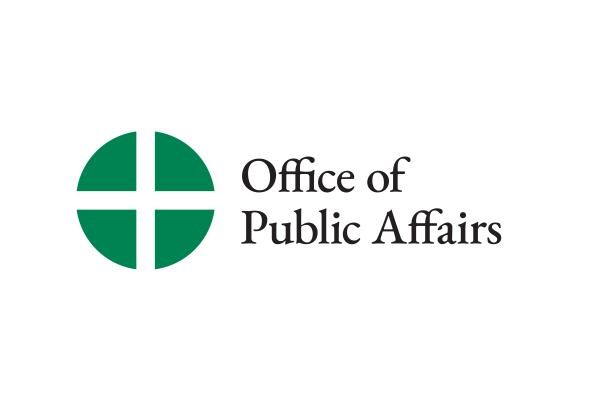North American Orthodox-Catholic Theological Consultation Holds 64th Meeting; Continues Its Study of Filioque Question
WASHINGTON (June 12, 2003) -— The North American Orthodox-Catholic Theological Consultation held its 64th meeting from May 27 to 29, 2003, at St. Vladimir's Orthodox Seminary in Crestwood, New York. It was hosted by the Standing Conference of Canonical Orthodox Churches in the Americas (SCOBA), and
WASHINGTON (June 12, 2003) -— The North American Orthodox-Catholic Theological Consultation held its 64th meeting from May 27 to 29, 2003, at St. Vladimir's Orthodox Seminary in Crestwood, New York. It was hosted by the Standing Conference of Canonical Orthodox Churches in the Americas (SCOBA), and was co-chaired by Archbishop Daniel Pilarczyk of Cincinnati and Metropolitan Maximos of Pittsburgh.
The main focus of the meeting was a continuation of the Consultation's four-year study of the filioque question. The original version of the Nicene-Constantinopolitan Creed that dates from the 4th century and is still used by the Orthodox states that the Holy Spirit "proceeds from the Father." The word filioque ("and from the Son") was later added to the Latin version of this Creed used in the West, so that the phrase would read that the Holy Spirit "proceeds from the Father and the Son." This modification appeared in some areas of western Europe as early as the 5th century but was accepted in Rome only in the 11th century. This change in the wording of the Creed and the underlying variations in understanding the origin and procession of the Holy Spirit within the Trinity have long been considered a church-dividing issue between the two communions.
Two papers were delivered in the first theological session. Rev. John P. Galvin spoke on "The Economic and the Immanent Trinity: A Survey of Recent Catholic Discussion." Rev. Robert Stephanopoulos then presented an article by Metropolitan John (Zizioulas) of Pergamon, "One Single Source: An Orthodox Response to the Clarification on the Filioque," the 1995 Vatican document that set forth the position of the Catholic Church on this difficult issue.
The subsequent theological sessions were devoted entirely to considering the text of a draft agreed statement on the Orthodox and Catholic traditions concerning the origin of the Holy Spirit. It was carefully examined, and the members had an opportunity to offer observations and comments on each paragraph. A revised version of the text will be produced over the summer and sent to the members who will be invited to submit further reflections in view of drafting a third version for consideration at the Consultation's next meeting.
Two evening sessions were devoted to an examination of current events in the churches. These information sessions considered the appointment of Brian Farrell as Secretary of the Pontifical Council for Promoting Unity and of Angelo Amato as Secretary of the Congregation for the Doctrine of the Faith, the presence of a Vatican delegation at the Ecumenical Patriarchate for the Feast of St. Andrew in November 2002, the approval of a new charter for the Greek Orthodox Archdiocese of America and the new titles given to its metropolitans, developments in SCOBA, relations between the Vatican and the Moscow Patriarchate, the move of the headquarters of the Ukrainian Greek Catholic Church to Kiev and the possible establishment of a Ukrainian Greek Catholic patriarchate, the effort to create a united Russian Orthodox jurisdiction in Western Europe, the visit of a Vatican delegation to the Church of Greece and the visit of a Serbian Orthodox delegation to the Vatican in February 2003, the election of Archimandrite Evangelos Kourounis as Metropolitan of New Jersey, developments in the international Orthodox-Catholic dialogue, the "Christian Churches Together in the USA" initiative, the new papal encyclical Ecclesia de Eucharistia, the response of our churches to the war in Iraq, a symposium on the "Petrine ministry" in Rome with the participation of Orthodox theologians, the Princeton Statement on Christian Unity, and developments regarding the ordination of married men to the priesthood in Eastern Catholic jurisdictions outside their homelands. The members of the Consultation attended a Divine Liturgy celebrated by Metropolitan Maximos in the seminary chapel on the morning of May 28.
The 65th meeting of the Consultation is scheduled to take place from October 23 to 25, 2003, at St. Paul's College in Washington, DC, and the 66th meeting will be held from June 1-3, 2004, at Holy Cross Greek Orthodox School of Theology in Brookline, Massachusetts.
In addition to the two co-chairmen, the Orthodox members of the Consultation include Father Thomas FitzGerald (Secretary), Archbishop Peter of New York (OCA), Father Nicholas Apostola, Prof. Susan Ashbrook Harvey, Father Alkiviadis Calivas, Father James Dutko, Prof. John Erickson, Father Alexander Golitzin, Father Emmanuel Gratsias, Dr. Robert Haddad, Father Paul Schnierla, and Father Robert Stephanopoulos. Orthodox staff members are Bishop Dimitrios of Xanthos, General Secretary of SCOBA and Father Gregory Havrilak of the office for Ecumenical and Interreligious Relations, SCOBA. The additional Catholic members are Father Brian Daley, SJ (secretary), Msgr. Frederick McManus, Prof. Thomas Bird, Father Peter Galadza, Msgr. John D. Faris, Father John Galvin, Sister Jean Goulet, CSC, Father Sidney Griffith, ST, Father John Long, SJ, Father David Petras, Prof. Robin Darling Young, and Father Ronald Roberson, CSP (staff).

